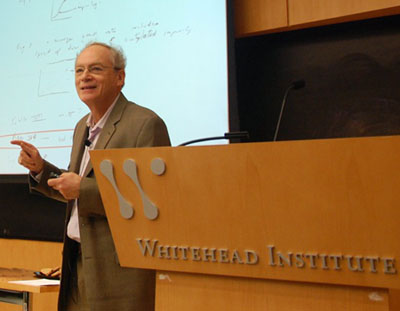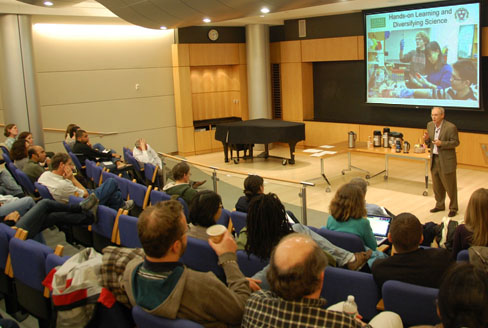Microbiologist Prof Rich Kosick of the Harvard University IDEAS program outlined his program to bring diversify to the fields of science scholarship and research at last week's Biology Group Meeting on Friday April 15. He also shared his experience with Hands-on learning and it's efficacy as a way to engage and retain students at risk for dropping out of science careers.

The IDEAS program (Increasing Diversity and Educational Access to Science) is aimed at solving a common problem in higher education wherein many students who start college intending to major in science fail to do so. The problem is especially prevalent in students from disadvantaged backgrounds. Losick believes that large impersonal introductory science courses which fail to engage and support fledgling scientists are partly to blame. He also believes that these courses foster a disconnect between learning science and doing science. And finally, Losick believes that sustained and productive involvement in the science fields requires strong mentoring as well as early successes in laboratory research for freshmen and undergraduates.
Prof Losick's program is geared towards entering Harvard students who have strong science interest and who also come from disadvantage backgrounds. The intent of Losick's program is to engage students in a long-term relationship with a mentor and to give them a deep experience in a lab. Losick believes that these two elements are critical to professional success in science. One of Losick's strategies is to pay students to do research during the term, as well as part-time and over the summer in lieu students performing unrelated of jobs. Another strategy is to create a sustained community of support, using upperclass students and program alumni as mentors.

Losik's success has been remarkable. Of 30 recent alumni graduates from the program, 29 have remained in the sciences; 2 are in phd/md programs, 16 are applying and 10 are in graduate school.
A corollary component to the IDEAS program is the hand-on lab experience. When Harvard added a new science building 5 years ago, Losick successfully lobbied to create a laboratory dedicated to freshman research in the new building. The now finished undergraduate wing of Northwest Hall is open and utilized 24/7 with laboratory areas surrounded by glass so that project participants can observe one another and find possible areas of collaboration and discussion.
Losick concluded his talk with some reflections on teaching and research. He observed that faculty often see teaching and research in competition with each other, with the notion that less competent colleagues do the teaching so that the 'luminaries' don't have to. But Losick think this perspective is incorrect and misses the essence of teaching. From his personal experience Losick shared, "I am a better scientist for being a teacher.... and I am a better teacher for being a scientist." Losick's ultimate goal is to create a teacher-scientsit culture at Harvard.
From the looks of it, he is well on the way to doing so.